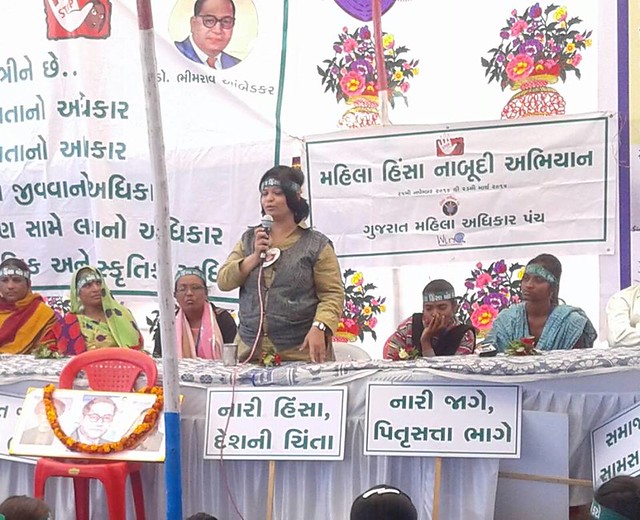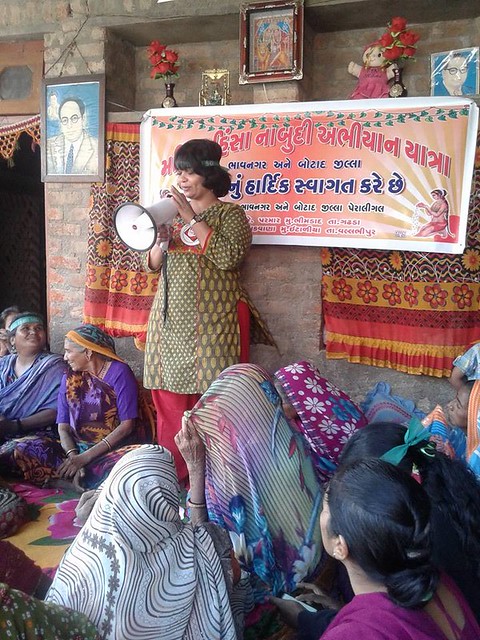By Amit Kumar
For Manjula Pradeep, growing up in Baroda and attending an English-medium school meant her childhood was like any other child, at least on the surface. However, it was not until the age of 12, when she visited her father’s home in UP, that she realised who she was, and what her identity meant. She came to know that she was a Dalit and saw the condition in which her extended family stayed. “I was always a girl who questioned a lot, but that trip opened a popped up a lot of new questions and the answers were not always available,” she tells Twocircles.net.

Thirty five years later, as the head of Executive Director of Navsarjan a grassroots Dalit organisation dedicated to ensuring human rights for all, she is still looking for answers.
It was not as if the questions popped up all in one go: the system of caste often works through a web of roles and duties assigned to various stakeholders. Manjula remembers an incident in Class 8, which left a deep mark on her psyche. “My Sanskrit teacher, who was a Brahmin, would often add an upper-caste surname to my name while calling me: like, she would say Manjula Sharma. It was then that I realised that as a Dalit, we are almost always taught to hide our identity or ‘overcome’ it. I wanted to be proud of who I was: a Dalit, and a woman.”
Born to parents who moved to Baroda from UP after her father got a job at ONGC, Manjula finished her high school and ended up joining MS University for her graduation in Commerce. “Looking back, I do believe that getting a good education and having parents who wanted me and my sister to study hard, helped,” she adds. But after graduation, her career took a different turn, a result of all her observations until now. “Since childhood, the two things I spoke most against were gender and caste discrimination, and when I realised that a Masters in Social Work would help me work on these issues, there was no looking back,” says Manjula. Although her father protested a little and instead asked her to continue in Commerce, Manjula had found her calling.
In 1992, after she finished her Masters, she joined Navsarjan as the organisation’s first woman employee.
“At that time, our office had barely any resource or money. Despite being the most qualified person in the office, I donned all sorts of roles: from the work of a peon to that of an accountant. However, all these things taught me how to work in an organisational set-up, which, I believe, was extremely important,” she says.

Not that her work was an easy affair: as a Dalit organisation which was seeking to fight caste discrimination, her work was cut out. She worked on a number of projects on school curriculum, advocacy, legal aid and women empowerment with the organisation, which was active in only five districts at that time. Once she started working on the ground, she also realised that she needed to work on her language skills, as most of her work was in Gujarati, which was not her mother tongue. “Our main area of work has always been what was said by Babasaheb Ambedkar: annihilation of caste. When I started working, I realised that the only way to do this is to systematically question the privileges that upper-castes enjoy and empower Dalits and Adivasis, so that they can stake claim to what is theirs,” says Manjula.
She also remembers the impact that real-life cases made on her work and understanding. “Seeing an old woman fight to get justice for her son who was beaten up mercilessly by the police and his body hung outside his house made me realise how difficult it was for Dalits to get justice,” she says. Having understood that she needed to strengthen her legal understanding too, Manjula joined an LLB course at the Gujarat State University in 1994.
A decade later, having worked with the organisation for about 12 years, she was appointed Executive Director of Navsarjan. Today, under her watchful eyes, a team of 115 people work on legal aid, women empowerment, library and other educational schemes for Dalits in over 3,00 villages across Mehsana, Ahmedabad, Baroda, Anand etc.
Of course, working on such issues has also meant that not everyone has been hospitable to her idea of annihilating caste. However, she understands the challenges and believes that following the constitution, the greatest gift of Babasaheb Ambedkar to the marginalised communities of India, remains the focus of the organisation. “We are not trying to break the system, but yes, we are fighting against it because it remains concentrated in the hands of a few people,” she says. In this regard, she also said that the question of caste must be questioned equally within the feminist discourse too. “A lof of times I have been asked as to why I raise questions of caste when talking on women’s issue. But I believe that in India, it is impossible to not talk of the two together. Women from marginalised communities face problems on twin front: caste and gender: not questioning this will only mean we never address the real issue,” she says.
In 2008, Manjula defended the case of a young Dalit girl who had suffered long-term gang rape by six professors in her college. The year-long case put her against caste leaders, politicians, media, police and the courts, but finally, justice was ensured: all the six accused were awarded life imprisonment. Navsarjan then took on more than 35 cases of sexual violence against minors and young women and today, legal aid remains one of the most important areas of work for her and Navsarjan.
Her experience in Gujarat also shows that even after a decade of ‘development’, the issues remain the same. “Even now, we have to tell people that being a Dalit is not something to be ashamed of. We ask them understand and respect our origins, and fight for our rights,” she says. Issues like migration of male members of the society, especially among Adivasis, are a priority for the organisation. The solution, according to Manjula, is to mobilise all forces that are fighting against caste-based suppression. “Dalits, Muslims, Tribals need to work together because unless we do this, we are unlikely to make an impact and change our condition,” she says. However, she added that at the same time, there were enough forces which seek to break their unity. “Our most powerful weapon remains the Constitution, but even after so many years, there are numerous examples to show how strong the caste system is. Recently, we the Gujarati Media did a number of stories on how cremation grounds are different for Dalits and non-Dalits. Whether in Anand, Mehsana, Ahmedabad, Baroda or other places, this is what we are fighting for. Even in death, a Dalit is marked different. We want to end that, without any compromises,” says Manjula. For now, the fight continues, as a Dalit, as a woman, and as a person who wishes to see more equality in the society.
Related:

